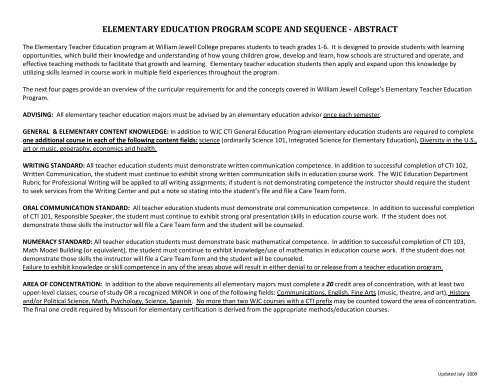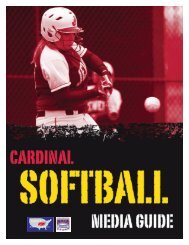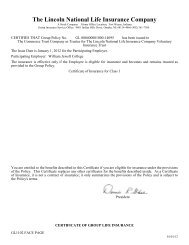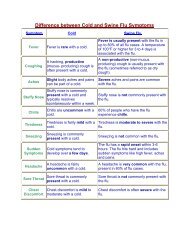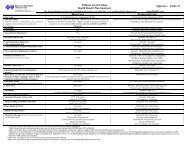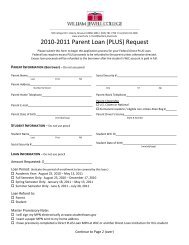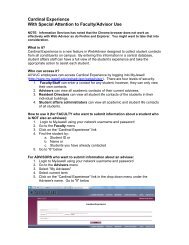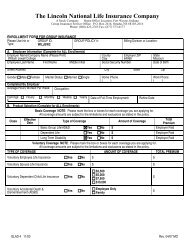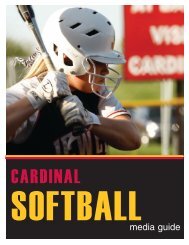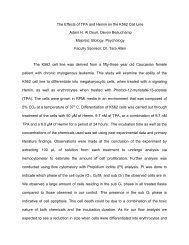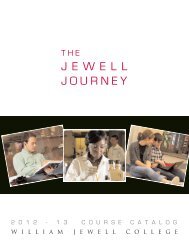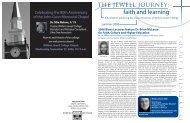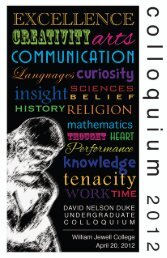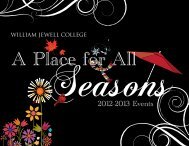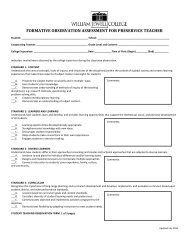elementary education program scope and sequence - abstract
elementary education program scope and sequence - abstract
elementary education program scope and sequence - abstract
You also want an ePaper? Increase the reach of your titles
YUMPU automatically turns print PDFs into web optimized ePapers that Google loves.
ELEMENTARY EDUCATION PROGRAM SCOPE AND SEQUENCE ABSTRACT<br />
The Elementary Teacher Education <strong>program</strong> at William Jewell College prepares students to teach grades 1‐6. It is designed to provide students with learning<br />
opportunities, which build their knowledge <strong>and</strong> underst<strong>and</strong>ing of how young children grow, develop <strong>and</strong> learn, how schools are structured <strong>and</strong> operate, <strong>and</strong><br />
effective teaching methods to facilitate that growth <strong>and</strong> learning. Elementary teacher <strong>education</strong> students then apply <strong>and</strong> exp<strong>and</strong> upon this knowledge by<br />
utilizing skills learned in course work in multiple field experiences throughout the <strong>program</strong>.<br />
The next four pages provide an overview of the curricular requirements for <strong>and</strong> the concepts covered in William Jewell College’s Elementary Teacher Education<br />
Program.<br />
ADVISING: All <strong>elementary</strong> teacher <strong>education</strong> majors must be advised by an <strong>elementary</strong> <strong>education</strong> advisor once each semester.<br />
GENERAL & ELEMENTARY CONTENT KNOWLEDGE: In addition to WJC CTI General Education Program <strong>elementary</strong> <strong>education</strong> students are required to complete<br />
one additional course in each of the following content fields: science (ordinarily Science 101, Integrated Science for Elementary Education), Diversity in the U.S.,<br />
art or music, geography, economics <strong>and</strong> health.<br />
WRITING STANDARD: All teacher <strong>education</strong> students must demonstrate written communication competence. In addition to successful completion of CTI 102,<br />
Written Communication, the student must continue to exhibit strong written communication skills in <strong>education</strong> course work. The WJC Education Department<br />
Rubric for Professional Writing will be applied to all writing assignments; if student is not demonstrating competence the instructor should require the student<br />
to seek services from the Writing Center <strong>and</strong> put a note so stating into the student’s file <strong>and</strong> file a Care Team form.<br />
ORAL COMMUNICATION STANDARD: All teacher <strong>education</strong> students must demonstrate oral communication competence. In addition to successful completion<br />
of CTI 101, Responsible Speaker, the student must continue to exhibit strong oral presentation skills in <strong>education</strong> course work. If the student does not<br />
demonstrate those skills the instructor will file a Care Team form <strong>and</strong> the student will be counseled.<br />
NUMERACY STANDARD: All teacher <strong>education</strong> students must demonstrate basic mathematical competence. In addition to successful completion of CTI 103,<br />
Math Model Building (or equivalent), the student must continue to exhibit knowledge/use of mathematics in <strong>education</strong> course work. If the student does not<br />
demonstrate those skills the instructor will file a Care Team form <strong>and</strong> the student will be counseled.<br />
Failure to exhibit knowledge or skill competence in any of the areas above will result in either denial to or release from a teacher <strong>education</strong> <strong>program</strong>.<br />
AREA OF CONCENTRATION: In addition to the above requirements all <strong>elementary</strong> majors must complete a 20 credit area of concentration, with at least two<br />
upper‐level classes, course of study OR a recognized MINOR in one of the following fields: Communications, English, Fine Arts (music, theatre, <strong>and</strong> art), History<br />
<strong>and</strong>/or Political Science, Math, Psychology, Science, Spanish. No more than two WJC courses with a CTI prefix may be counted toward the area of concentration.<br />
The final one credit required by Missouri for <strong>elementary</strong> certification is derived from the appropriate methods/<strong>education</strong> courses.<br />
Updated July 2009
1 ST ‐2 ND YEAR<br />
Fall & Spring<br />
Annually<br />
EDU 201 Art<br />
EDU 202 Music<br />
EDU 203 PE<br />
1 ST YEAR<br />
Fall & Spring Annually<br />
1 st ‐2 nd YEAR<br />
Fall & Spring Annually<br />
EDU 205 (2) EDU 211 (2)/212 (1)<br />
Pre‐requisite EDU 205<br />
Expressive Arts Educational Psychology Techniques of Teaching<br />
First Field Experience –<br />
Suburban<br />
PE methods for<br />
Elementary<br />
Teachers<br />
Art methods<br />
for Elementary<br />
Teachers<br />
Music methods<br />
for Elementary<br />
Teachers<br />
Learning Theories tied to practice<br />
of instruction/ assessment:<br />
Intentional Teacher (reflection);<br />
Education/Psych Research;<br />
Brain‐based research<br />
Information processing &<br />
memory;<br />
Individual intelligence<br />
(st<strong>and</strong>ardized testing: use &<br />
interpretation; apply statistical<br />
knowledge from CTI 103) &<br />
differences (learning styles) &<br />
intro to differentiated instruction;<br />
Child & Adolescent growth <strong>and</strong><br />
development‐<br />
Cognitive, Socio‐emotional<br />
(identity), Physical (health;<br />
nutrition; safe/ dangerous<br />
behaviors: drug Alcohol abuse,<br />
eating disorders, self‐ mutilation,<br />
sexual identity/behavior)<br />
Personality/Affective/Moral,<br />
Language; personality inventories;<br />
Intro to Teacher Role/Profession<br />
Social learning theory –<br />
constructivism/cognitivist, multiculturalism,<br />
scaffolding, ZPD;<br />
Intro. teacher constructed<br />
assessment (selected response,<br />
constructed response,<br />
performance assessment, scoring<br />
guide, rubrics, construction.)<br />
Behaviorism – Reinforcement,<br />
motivation, intro to classroom<br />
management.<br />
Bloom’s taxonomy –<br />
promotion of critical thinking.<br />
Essential Teaching strategies<br />
based on research<br />
5 lesson approaches:<br />
Deductive, Direct, Inductive,<br />
Inquiry, <strong>and</strong> Jigsaw; Study<br />
different lesson approaches.<br />
Compare & underst<strong>and</strong><br />
differences: cognitivist/<br />
behaviorist.<br />
Connect theorists <strong>and</strong> their<br />
research to the different lesson<br />
approaches studied.<br />
Practice lesson writing <strong>and</strong><br />
evaluation (assessment of<br />
lessons/implications for<br />
implementation.<br />
Intro to professional journals,<br />
MOSTEP st<strong>and</strong>ards, <strong>and</strong><br />
Teacher Work Sample.<br />
Field Experience:<br />
Suburban partner schools.<br />
42‐48 contact hours<br />
Observe <strong>and</strong> reflect on<br />
classroom operation, lesson<br />
implementation; identify<br />
lesson approach & analyze.<br />
Specific assignments in<br />
syllabus.<br />
1 ST ‐2 ND YEAR<br />
Fall & Spring<br />
Annually<br />
1 ST ‐2 ND ‐3 rd YEAR<br />
Fall & Spring Annually<br />
1 ST ‐2 ND ‐3 rd<br />
YEAR<br />
Fall & Spring<br />
Annually<br />
2 ND‐ 3 rd YEAR<br />
Fall & Spring<br />
Annually<br />
Junior/Senior<br />
YEAR<br />
Spring Annually<br />
EDU 215 (2) EDU 234 (3) Psych 305 (2) CTI 284 (4) EDU 405<br />
Information Tech Exceptional Child Child<br />
Psychology<br />
Word<br />
PowerPoint<br />
Excel<br />
Internet<br />
Graphics<br />
Tables<br />
Charts &<br />
graphs<br />
Newsletters<br />
Mail merge<br />
Web Design<br />
Chat rooms<br />
Email – use in<br />
instruction.<br />
WebQuest<br />
IAdventure<br />
Gradebook<br />
Test Writing<br />
On‐line<br />
assessment<br />
Surveys<br />
Zoomerang<br />
Palm Pilot use<br />
GPS<br />
Scanning<br />
Writing to<br />
CD/DVD<br />
Video‐streaming<br />
Image<br />
manipulation<br />
Software<br />
evaluation.<br />
4 part objective<br />
(cognitive, affective,<br />
psychomotor, social)<br />
Definition, Identification,<br />
Characteristics,<br />
Intervention,<br />
Accommodation/Modifica<br />
tion<br />
Range of all Exceptions<br />
(including gifted, at‐risk &<br />
neglected) placement<br />
models/options; referral.<br />
LRE; IEP.<br />
Individualized objectives.<br />
Classroom teacher’s role.<br />
Range of school practice<br />
(Inclusion models) &<br />
implications for<br />
teacher. Finding<br />
resources/<br />
meeting individual needs.<br />
Individualizing instruction.<br />
Socialization Skills.<br />
Parent Communication;<br />
Behavior<br />
Mod/Intervention<br />
strategies.<br />
Assistive Devices.<br />
Law‐IDEA;504<br />
Reporting‐ Requirements<br />
(abuse)<br />
Non‐discriminatory<br />
diagnostic procedures.<br />
Physical,<br />
cognitive,<br />
socioemotion<br />
al<br />
development<br />
of children<br />
from birth<br />
through late<br />
childhood.<br />
School & Society<br />
Cultural/ historical<br />
context of<br />
schooling.<br />
Over‐lay of U.S.<br />
public school dev.<br />
on general U.S.<br />
history.<br />
Stratification by<br />
SES; Segregation<br />
by gender, race,<br />
ethnicity; Inequity.<br />
Influence of<br />
Religion, Societal/<br />
Economic<br />
Expectations,<br />
Competing<br />
Political Interests;<br />
Sociological<br />
perspectives;<br />
Diversity;<br />
Curriculum.<br />
School<br />
organization.<br />
Philosophical<br />
bases of<br />
<strong>education</strong>al<br />
thought.<br />
Education Law.<br />
Intro to MO<br />
Curriculum<br />
Frameworks.<br />
Written<br />
Communication<br />
Skills (Rubric); APA<br />
format.<br />
Classroom<br />
Management<br />
Updated July 2009
2 nd YEAR<br />
Spring<br />
Annually<br />
EDU 250 (3)<br />
Pre‐req. EDU 211<br />
Methods of<br />
Teaching<br />
Communication<br />
Arts:<br />
Writing/Speaking<br />
NCTE/IRA<br />
St<strong>and</strong>ards;<br />
MO Curr.<br />
Frameworks;<br />
MO Show‐Me<br />
St<strong>and</strong>ards;<br />
Writing: letters,<br />
stories, reports,<br />
biographies,<br />
poetry, diaries,<br />
journals, children’s<br />
lit models;<br />
Listening: types,<br />
strategies;<br />
Speaking: oral<br />
reports,<br />
interviews, role<br />
play, puppets,<br />
drama;<br />
Viewing;<br />
Visually<br />
Representing;<br />
Graphic<br />
organizers;<br />
Professional<br />
journals;<br />
Internet resources;<br />
Child Lit. as<br />
models;<br />
Writing Process;<br />
6+ Traits;<br />
Writing Workshop;<br />
Assessment:<br />
rubrics,<br />
observation, check<br />
Junior YEAR<br />
Fall Annually<br />
BLOCK I<br />
EDU 301 (3)/EDU<br />
311 (1)<br />
Pre‐req. EDU 250<br />
& admission to<br />
teacher <strong>education</strong><br />
Methods of<br />
Teaching Comm.<br />
Arts: Reading<br />
2 nd Field ‐Urban<br />
Experience<br />
NCTE/IRA<br />
St<strong>and</strong>ards;<br />
NCTE/IRA<br />
St<strong>and</strong>ards;<br />
MO Curr.<br />
Frameworks; GLE’s<br />
MO Show‐Me<br />
St<strong>and</strong>ards;<br />
Characteristics of<br />
successful reading<br />
teachers;<br />
Theories related to<br />
practice;<br />
Language cueing<br />
systems;<br />
Professional<br />
journals;<br />
Internet resources;<br />
Emergent literacy;<br />
Meeting the needs<br />
of diverse<br />
students;<br />
Phonemic<br />
awareness;<br />
Phonics;<br />
Comprehension<br />
strategies:<br />
narrative text,<br />
expository text,<br />
poetry; Children’s<br />
literature use;<br />
Inferences;<br />
Questioning:<br />
taxonomies,<br />
QAR’s, ReQuest;<br />
Junior YEAR<br />
Fall Annually<br />
BLOCK I<br />
EDU 312 (2)<br />
Pre‐req. admission<br />
to teacher<br />
<strong>education</strong><br />
Methods of<br />
Teaching<br />
Elementary<br />
Science<br />
NSES st<strong>and</strong>ards;<br />
MO Science<br />
Frameworks; GLE’s<br />
Science as inquiry;<br />
Emphasis on both<br />
process <strong>and</strong><br />
products of<br />
Science;<br />
Lesson plans using<br />
5‐E model:<br />
engage, explore,<br />
explain, elaborate,<br />
evaluate;<br />
Practice & final<br />
lessons;<br />
descriptive,<br />
classifactory,<br />
controlled<br />
investigations;<br />
Long range plans –<br />
Units: physical<br />
science, earth<br />
science, life<br />
science;<br />
Analysis of lessons:<br />
video case studies,<br />
peer evaluation,<br />
simulations;<br />
Harlen’s<br />
questioning<br />
strategies <strong>and</strong><br />
types; Wide<br />
variety of<br />
assessment<br />
models;<br />
Junior YEAR<br />
Fall Annually<br />
BLOCK I<br />
EDU 313 (2)<br />
Pre‐req. admission<br />
to teacher<br />
<strong>education</strong><br />
Methods of<br />
Teaching Elem.<br />
Social Studies<br />
NCSS St<strong>and</strong>ards;<br />
MO SS<br />
Frameworks; GLE’s<br />
SS content<br />
knowledge & core<br />
concepts (time,<br />
space, chronology,<br />
spatial world,<br />
mapping/map<br />
reading, historical<br />
reasoning,<br />
viewpoint,<br />
continuity &<br />
change, culture,<br />
individuals –<br />
groups &<br />
institutions, civic<br />
life, politics, U.S.<br />
govt., values,<br />
citizenship/decisio<br />
n‐making,<br />
community<br />
service, global<br />
citizenship,<br />
science, tech. &<br />
society, patterns<br />
social/econ.<br />
interdependence,<br />
production–<br />
distribution–<br />
consumption,<br />
needs & wants,<br />
scarcity/ wealth,<br />
cost/benefit,<br />
consumer ed.,<br />
Junior YEAR<br />
Spring Annually<br />
BLOCK II<br />
EDU 303 (3)/EDU<br />
315 (1)<br />
Pre‐req. EDU 301<br />
Analysis &<br />
Correction of<br />
Comm. Arts,<br />
Elementary<br />
Methods<br />
NCTE/IRA<br />
St<strong>and</strong>ards;<br />
MO Curr.<br />
Frameworks;<br />
MO Show‐Me<br />
St<strong>and</strong>ards;<br />
Purposes of<br />
assessment;<br />
No Child Left<br />
Behind;<br />
Informal<br />
assessment<br />
measures:<br />
observations,<br />
running records,<br />
IRI, spelling,<br />
writing;<br />
Portfolios;<br />
Formal<br />
Assessment<br />
measures;<br />
Levels of reading:<br />
early emergent,<br />
emergent,<br />
developing,<br />
mature;<br />
Factors associated<br />
with reading<br />
difficulties;<br />
ESL <strong>and</strong> ELL<br />
<strong>program</strong>s;<br />
Plan, teach <strong>and</strong><br />
assess lessons<br />
based on student<br />
needs;<br />
Junior YEAR<br />
Spring Annually<br />
BLOCK II<br />
Junior YEAR<br />
Spring Annually<br />
BLOCK II<br />
Senior YEAR<br />
Fall or Spring<br />
Annually<br />
ED314 (2) EDU 309 (5) EDU 401 (2)<br />
Pre‐req.<br />
admission to<br />
student<br />
teaching.<br />
Methods of Teaching<br />
Integrated Curriculum<br />
BLOCK – 3 rd Field<br />
Experience<br />
Curriculum integration<br />
definition;<br />
Theories supporting<br />
integration – brainbased<br />
theory,<br />
constructivism;<br />
Rationale for & MO<br />
Frameworks for<br />
Curriculum Integration;<br />
Mapping planned<br />
activities using Show‐<br />
Me St<strong>and</strong>ards & MO<br />
Frameworks;<br />
Team planning with<br />
public school classroom<br />
teacher;<br />
Analysis of resource<br />
base for activity<br />
development;<br />
Selection of age<br />
appropriate activities;<br />
Criteria/guidelines for<br />
TOPIC selection;<br />
Rol<strong>and</strong> case criteria for<br />
good curricular<br />
integration: significance,<br />
coherence, relevance;<br />
Curricular web<br />
development: topical<br />
<strong>and</strong> discipline;<br />
Research for TOPIC<br />
development <strong>and</strong><br />
implementation<br />
success;<br />
Peer review <strong>and</strong> self<br />
Content/Methods<br />
of Teaching Math<br />
for Elem Teachers<br />
Rural & Pre‐<br />
Student Teaching<br />
NCTM Principles<br />
<strong>and</strong> St<strong>and</strong>ards;<br />
MO Math<br />
Frameworks; GLE’s<br />
Identification of<br />
Math tasks:<br />
selection, planning<br />
<strong>and</strong><br />
implementation;<br />
10 Problem Solving<br />
Strategies;<br />
Conceptual & Skill<br />
development with<br />
manipulatives;<br />
Multiple<br />
Embodiments<br />
Principle;<br />
Mathematics<br />
Knowledge:<br />
number sense,<br />
problem solving,<br />
reasoning,<br />
communication,<br />
geometry, data<br />
analysis,<br />
probability,<br />
number theories,<br />
patterns/<br />
Relationships;<br />
Professional<br />
development<br />
through NCTM<br />
journal readings;<br />
Math lesson<br />
planning <strong>and</strong><br />
Reflective<br />
Student<br />
Teaching<br />
Seminar<br />
Management;<br />
Discipline;<br />
Ethics;<br />
Learners;<br />
Individual<br />
Diversity<br />
Curriculum;<br />
Instructional<br />
models;<br />
Communicatio<br />
n;<br />
Assessment;<br />
Classroom<br />
Research;<br />
Portfolio/<br />
Teacher Work<br />
Sample<br />
construction;<br />
Writing/<br />
Reflection<br />
Skills (Rubric<br />
Journal);<br />
Professional<br />
demeanor;<br />
Interaction<br />
with<br />
colleagues;<br />
Support<br />
Services;<br />
Technology<br />
use;<br />
Job search;<br />
Natl Bd Cert<br />
Senior YEAR Fall<br />
or Spring<br />
Annually<br />
EDU 410 (10)<br />
Pre‐req. admission<br />
to student<br />
teaching.<br />
Student Teaching<br />
Fourth Field<br />
Experience<br />
All experiences in<br />
student teaching.<br />
Implement<br />
instruction/<br />
assessment.<br />
Reflect on <strong>and</strong><br />
improve teaching<br />
performance.<br />
Perform as<br />
professional in<br />
school building.<br />
Improve the<br />
1‐6 students’<br />
performance.<br />
Updated July 2009
sheets;<br />
Relationship of<br />
theory to practice;<br />
Individual<br />
differences;<br />
Curriculum<br />
models;<br />
Stages of literacy<br />
development;<br />
H<strong>and</strong>writing;<br />
Spelling;<br />
Grammar <strong>and</strong><br />
usage;<br />
Punctuation <strong>and</strong><br />
Capitalization.<br />
Early intervention<br />
<strong>program</strong>s: Reading<br />
Recovery, First<br />
Steps, Success for<br />
All;<br />
Reading fluency;<br />
Vocabulary;<br />
Basal readers;<br />
Instructional<br />
patterns: guided<br />
reading, 4 blocks,<br />
literature circles,<br />
reading workshop,<br />
independent<br />
reading;<br />
Study Strategies;<br />
Planning, teaching<br />
<strong>and</strong> reflecting on<br />
lessons taught by<br />
self & others;<br />
Prepare rubrics<br />
<strong>and</strong> scoring guides.<br />
Field Experience:<br />
Urban partner<br />
schools.<br />
42‐48 contact<br />
hours.<br />
Observe <strong>and</strong><br />
reflect on<br />
classroom<br />
operation; lesson<br />
implementation;<br />
analysis. Specific<br />
assignments in<br />
syllabus.<br />
Concept map<br />
development for<br />
units;<br />
Content<br />
knowledge<br />
development <strong>and</strong><br />
reinforcement;<br />
Time, materials<br />
<strong>and</strong> space<br />
management;<br />
Reinforcement of<br />
behavior<br />
management<br />
techniques;<br />
Peer review <strong>and</strong><br />
self assessment of<br />
lessons.<br />
power & choice,<br />
div. of labor;<br />
Lesson planning:<br />
field research,<br />
simulations, drama<br />
MAP assessment;<br />
Literacy &<br />
numeracy<br />
instruction in SS;<br />
Development of<br />
long‐range social<br />
studies integrated<br />
topic.<br />
Design <strong>and</strong> use<br />
rubrics <strong>and</strong> scoring<br />
guides;<br />
Work<br />
cooperatively with<br />
colleagues, special<br />
services personnel<br />
& parents;<br />
Strategies for<br />
dealing with<br />
individual<br />
differences;<br />
Motivating<br />
reluctant readers<br />
2 part Field<br />
Experience:<br />
1) Rural partner<br />
schools.<br />
42‐48 contact<br />
hours.<br />
Observe <strong>and</strong><br />
reflect on<br />
classroom<br />
operation, lesson<br />
implementation;<br />
analysis. Specific<br />
assignments in<br />
syllabus.<br />
2) Pre‐student<br />
teaching<br />
placement –<br />
assume<br />
responsibility in<br />
classroom to<br />
prepare for next<br />
semester student<br />
teaching. Plan TWS<br />
unit.<br />
assessment of lessons. assessment –<br />
reflection <strong>and</strong><br />
analysis;<br />
Role of technology<br />
in Mathematics;<br />
Basal text research<br />
<strong>and</strong> analysis;<br />
Mathematics in<br />
<strong>elementary</strong><br />
content.<br />
Updated July 2009
NAME: ____________________________________________________________<br />
DATE: ________________________________<br />
4YEAR PLAN FOR B.S. ELEMENTARY EDUCATION MAJORS<br />
2009‐2010<br />
Area of Concentration in Content Field that is applicable to Elementary Education is also required<br />
(English, Fine Arts (music, theatre, art), History & Political Science, Math, Psychology, Science, Spanish)<br />
Fall – Freshman Year<br />
Spring – Freshman Year<br />
Course Credit Hours Course Credit Hours<br />
CTI 1XX 4 Area of Concentration Content Course 4<br />
CTI 1XX 4 CTI 1XX 4<br />
Art or Music 2‐3 CTI 1XX 4<br />
EDU 205 Educational Psychology 2 EDU 211 Techniques of Teaching 2<br />
EDU 201, 202, 203 Elementary Art, Music,<br />
3 EDU 212 Fieldwork: Suburban 1<br />
P.E.<br />
Total Credit Hours 15‐16 PED 1XX Activity Course 1<br />
Total Credit Hours 16<br />
Fall – Sophomore Year<br />
Spring – Sophomore Year<br />
EDU 234 Exceptional Child 3 CTI 2XX [School & Society (P&J) or Pluralism<br />
4<br />
(C&T)]<br />
CTI 2XX (Science, Technology & Human<br />
4 EDU 250 Methods of Communication Arts –<br />
3<br />
Experience or Sacred & Secular)<br />
WLS<br />
PSY 305 Child Development 2 CTI 2XX (Science, Technology & Human<br />
4<br />
Experience or Sacred & Secular)<br />
SCI 101 Science for Elementary 4 Area of Concentration Content Course 4<br />
EDU 215 Information Technology 2 PED1XX Activity Course 1<br />
Total Credit Hours 15 Total Credit Hours 16<br />
Fall – Junior Year<br />
Spring – Junior Year<br />
CTI 2XX [Pluralism (C&T) or School & Society 4 EDU 303 Diagnosis & Correction 3<br />
(P&J)]<br />
EDU 301 Teaching Communication Arts:<br />
3 EDU 314 Integrated Curriculum 2<br />
Reading<br />
EDU 311 Fieldwork: Urban 1 EDU 315 Fieldwork: Rural & Pre‐ST 1<br />
Area of Concentration Content Course 4 EDU 309 Methods/Content Math Elem. 5<br />
EDU 313 Elementary SS Methods 2 Second Culture & Traditions for B.S. 4<br />
EDU 312 Elementary Science Methods 2 EDU 405 Classroom Management 2<br />
Total Credit Hours 16 Total Credit Hours 17<br />
Fall – Senior Year<br />
Spring – Senior Year<br />
EDU 410 Student Teaching 10 GEO 304 Economic Geography 4<br />
EDU 401 Student Teaching Seminar 2 CTI 4XX Capstone Course 4<br />
Total Credit Hours 12 PED 250 Health Science ‐ Children 2<br />
Area of Concentration Course 4<br />
Area of Concentration Course 4<br />
Total Credit Hours 18<br />
William Jewell College – Student H<strong>and</strong>book for Teacher Education & Certification<br />
Updated 07.09


